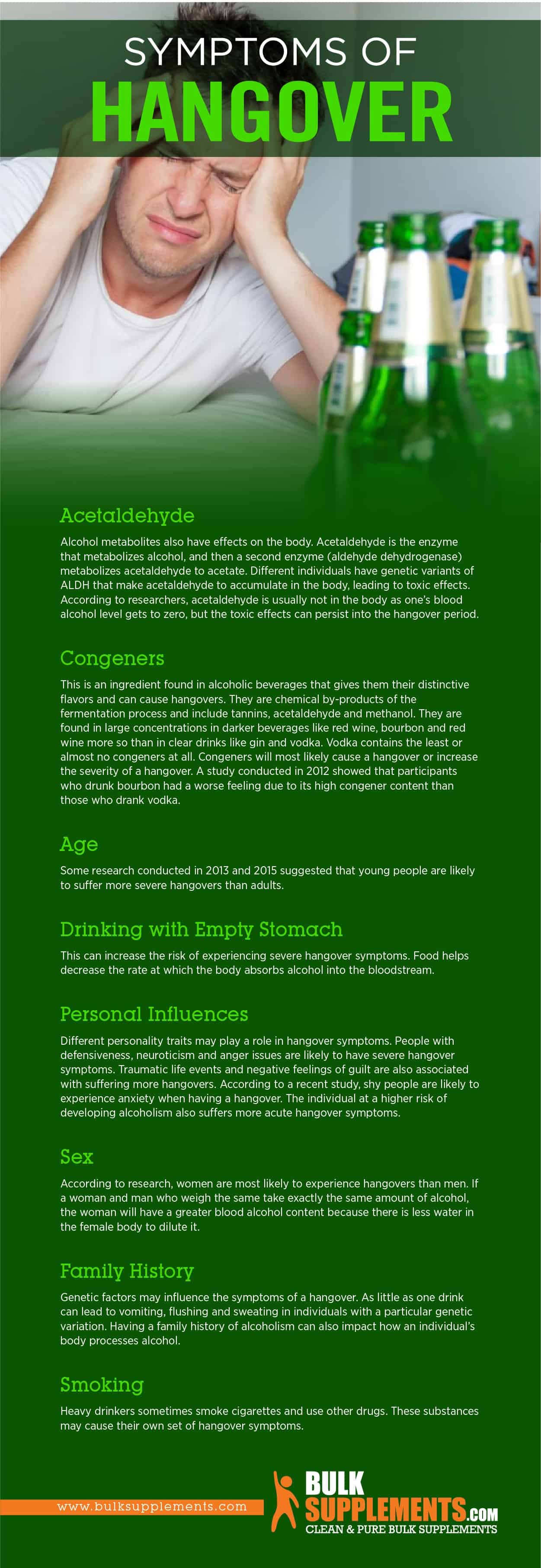Hangover: Characteristics, Causes & Treatment

Hangover
What is a Hangover?
People commonly find themselves going to parties, office luncheons and birthday celebrations where alcohol is being served. Not only do they feast, but they also consume alcohol. As a result, they wake up the following morning with a hangover, which they then nurse for the next day or two.
A hangover is a group of unpleasant symptoms like dizziness, confusion, abdominal pain, headaches, vertigo and nausea that develop after consumption of too much alcohol. An estimated 77 percent of drinkers have reported suffering from a hangover. These symptoms start as the blood alcohol level begins to drop. A hangover can occur at any time of the day, but is more common in the morning.
Apart from physical symptoms, a person may experience increased levels of regret, embarrassment, anxiety and depression. The severity of the symptoms is subject to the amount of alcohol consumed, and the quantity of sleep the sufferer had. Less sleep typically means a worse hangover. Alcohol interferes with brain activity during sleep, so a hangover may be a form of sleep deprivation.
No cure for hangovers has been discovered yet, but some remedies can help to speed recovery. Some include re hydrating, taking a nap, taking a walk and eating healthy meals with complex carbohydrates and proteins. Since breakfast is the most hangover-related meal, it could be a hangover remedy if boosted with bacon and scrambled eggs.
Hangover Causes
The primary cause of a hangover is consuming too much alcohol, which causes several adverse effects that vary among people. They include:
Increased Urine Production
An excessive amount of alcohol increases the rate of urination, which causes symptoms of dehydration like light-headedness, thirstiness and dizziness. This is because alcohol is a diuretic, which means it makes a person want to urinate more.
Gastrointestinal Effects
Alcohol can cause an inflamed stomach lining, which leads to stomach pain, nausea and vomiting. Alcohol also triggers excess stomach acid production, which may result in vomiting blood and ulceration. Another effect caused by alcohol is decreased water absorption by the intestines, which can lead to diarrhea. Alcohol can also lower or increase the passage of food through the gastrointestinal tract.
Difficulty Sleeping
Although excessive drinking makes a person feel sleepy, it also interferes with high-quality sleep. It disrupts sleep rhythm so people don’t wake up rested, but groggy and tired. Frequent night-waking causes less sleep overall, thus altering the body’s natural circadian rhythm.
Immune System Response
Alcohol consumption can impair the immune system. In fact, it may trigger an inflammatory response from the immune system that causes certain agents to produce physical symptoms, such as memory problems, difficulties concentrating, loss of interest in common activities and loss of appetite.
Vasodilation (Dilated Blood Vessels)
Alcohol causes blood vessels to widen or expand, which can lead to headaches once a person wakes up. Alcohol consumption is also thought to have effects on serotonin, histamine and prostaglandins hormones that may contribute to headaches.
Low Blood Sugar (Hypoglycemia)
Alcohol can cause a decrease in the blood sugar level and also limit the production of glucose in the body. As the body tries to excrete alcohol, the blood sugar level in the body drops. This causes weakness, fatigue, dizziness, mood disturbances, shakiness and seizures.
Electrolyte Imbalance
Drinking alcohol interferes with the body’s electrolyte levels. The body can also lose electrolytes through vomiting, diarrhea and sweating. Electrolyte imbalances can cause weakness, headaches and irritability.
These symptoms vary from individual to individual and can vary in intensity from mild to severe. At times, they can derail one’s entire day.
Other Factors That Can Contribute to a Hangover
Acetaldehyde
Alcohol metabolites also have effects on the body. Acetaldehyde is the enzyme that metabolizes alcohol, and then a second enzyme (aldehyde dehydrogenase) metabolizes acetaldehyde to acetate. Different individuals have genetic variants of ALDH that make acetaldehyde accumulate in the body, leading to toxic effects. According to researchers, acetaldehyde is usually not in the body as one’s blood alcohol level gets to zero, but the toxic effects can persist into the hangover period.
Congeners
This is an ingredient found in alcoholic beverages that gives them their distinctive flavors and can cause hangovers. They are chemical by-products of the fermentation process and include tannins, acetaldehyde and methanol. They are found in large concentrations in darker beverages like red wine and bourbon, more so than in clear drinks like gin and vodka. Vodka contains the least or almost no congeners at all. Congeners will most likely cause a hangover or increase the severity of a hangover. A study conducted in 2012 showed that participants who drank bourbon had a worse feeling due to its high congener content than those who drank vodka.
Age
Some research conducted in 2013 and 2015 suggested that young people are likely to suffer more severe hangovers than adults.
Drinking with Empty Stomach
This can increase the risk of experiencing severe hangover symptoms. Food helps decrease the rate at which the body absorbs alcohol into the bloodstream.
Personal Influences
Different personality traits may play a role in hangover symptoms. People with defensiveness, neuroticism and anger issues are likely to have severe hangover symptoms. Traumatic life events and negative feelings of guilt are also associated with suffering more hangovers. According to a recent study, shy people are likely to experience anxiety when having a hangover. The individual at a higher risk of developing alcoholism also suffers more acute hangover symptoms.
Sex
According to research, women are most likely to experience hangovers than men. If a woman and man who weigh the same take exactly the same amount of alcohol, the woman will have a greater blood alcohol content because there is less water in the female body to dilute it.
Family History
Genetic factors may influence the symptoms of a hangover. As little as one drink can lead to vomiting, flushing and sweating in individuals with a particular genetic variation. Having a family history of alcoholism can also impact how an individual’s body processes alcohol.
Smoking
Heavy drinkers sometimes smoke cigarettes and use other drugs. These substances may cause their own set of hangover symptoms.

Hangover Characteristics
Different people experience hangovers diversely. Symptoms usually vary depending on factors like personal chemistry, food in the system and the amount of alcohol consumed, among other factors. Some of the common symptoms include:
SEE ALSO

Receding Gums: Symptoms, Causes & Treatment
- Dehydration and excessive thirst
- Poor memory
- Headache
- Abdominal pain
- Drowsiness
- Muscle aches
- Profuse sweating
- Depression
- Anxiety
- Poor balance
- Rapid heartbeat
Hangover Treatments
There is no magic cure for a hangover. The only way to find relief is to allow the body to rest and recover by consuming healthy foods and beverages. Some natural remedies for a hangover are:
Rehydrate by Drinking Plenty of Water
Alcohol consumption causes dehydration. It is important for a person to take enough water to return his or her hydration levels to a healthy or normal range. People should drink water consistently after waking up in the morning. Sports drinks may also help recover lost electrolytes.
Eat Before or While Drinking
It can be beneficial to eat before or while drinking alcohol. Alcohol is absorbed more quickly on an empty stomach. Eating means absorption will be slower.
Use Essential Oils
Some essential oils include rosemary, lavender, peppermint, cardamom and fennel. These oils can be inhaled using a vaporizer to help re-energize, alleviate headaches and pain and also relieve nausea and vomiting.
Avoid Hair of the Dog
Hair of the dog is when a person drinks in order to ease the symptoms of a hangover. This is because of the notion that hangovers are a form of alcohol withdrawal, so drinking can ease the withdrawal. Of course, this is not true.
Supplements for Hangovers
Milk Thistle
Milk thistle is an herb that can help protect the liver from toxins and the effects of alcohol. As a dietary supplement, take 250 mg (scant 1/8 tsp) of milk thistle extract powder daily, or as indicated by a medical professional. You can take it with or without food.
Magnesium
Alcohol consumption makes the body get rid of magnesium through urinating. Deficiency in magnesium affects some biological processes like energy production and protein synthesis, also influencing major organs like the liver, brain, heart and skeletal muscles. Taking magnesium can help block the headaches and relieve the pressure.
N-acetyl Cysteine (NAC)
This supplement helps increase glutathione and lower acetaldehyde toxicity, which is the source of many hangover symptoms. N-acetyl L-cysteine (NAC) powder should be taken in serving sizes of 600 mg (scant ¼ tsp) up to three times per day, or as directed by a physician.
Ginger
Ginger tea can help with digestive upset and stabilize blood sugar levels, which are adversely affected by alcohol consumption. It can also help to stave off vomiting and settle the stomach. Take 1,000 mg (about ½ tsp) of ginger root extract powder once daily, or as directed by a physician.
The Bottom Line
A hangover refers to a group of symptoms that appear after overindulging in alcoholic drinks. Its symptoms vary from mild to severe and they include vertigo, headaches, nausea, memory loss and loss of coordination. Finding relief from a hangover can be approached by treating the symptoms separately. Prevention of a hangover can be achieved by moderate alcohol consumption or abstinence.



